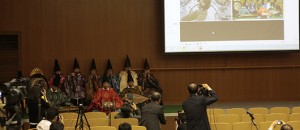 On the early morning of May 3, a group of students from Tenri University Gagaku Music Society joined Japanese astronaut Koichi Wakata, who was serving as the commander of the International Space Station (ISS), and American violinist Kenji Williams, who was one of the guest musicians in a studio at NASAʼs Johnson Space Center in Houston, in making music through video conferencing. The mouth organ called sho that Dr. Wakata played aboard the ISS had been donated by the Gagaku Music Society as part of the space-earth music collaboration, which came to fruition thanks to the initiative of Mr. Williams, director of Bella Gaia, a multimedia performance project that combines music with visual elements such as satellite imagery.
On the early morning of May 3, a group of students from Tenri University Gagaku Music Society joined Japanese astronaut Koichi Wakata, who was serving as the commander of the International Space Station (ISS), and American violinist Kenji Williams, who was one of the guest musicians in a studio at NASAʼs Johnson Space Center in Houston, in making music through video conferencing. The mouth organ called sho that Dr. Wakata played aboard the ISS had been donated by the Gagaku Music Society as part of the space-earth music collaboration, which came to fruition thanks to the initiative of Mr. Williams, director of Bella Gaia, a multimedia performance project that combines music with visual elements such as satellite imagery.
The joint performance, which was part of NASAʼs educational program called “Music in Space,” was streamed live from the studio in Houston. It was reported in some of Japanʼs major newspapers.
Through the Connection with Tenri
Mr. Williams came up with the idea of space-earth music collaboration since Dr. Wakata had shown an interest in the performance of Bella Gaia. In response to Mr. Wakataʼs wish to play a traditional Japanese musical instrument in space, Mr. Williams explored the possibility of collaboration with gagaku musicians. Previously in March 2013, he had performed together with Tenri Gagaku Music Society of New York—which includes many local Tenrikyo followers—at a commemorative event for the establishment of the sister-station relationship between Grand Central Station and Tokyo Station. Because of the connection, he approached Tenri Cultural Institute of New York, through which an official request for assistance was sent to Tenri University Gagaku Music Society last May.
The society responded by donating the sho to the astronaut, who was new to the instrument. Mr. Williams and Tenri Cultural Institute Executive Director Yoichi Fukui provided him with lessons on the instrument through a satellite link. Preparations were made over the course of one year.
Midnight Live Broadcast
At 1:30 a.m., May 3, (12:30 p.m. EST, May 2), the universityʼs Furusato Assembly Hall, where the Gagaku Music Society members had readied themselves for the program, was filled with an audience of about 100 people including Tenri City Mayor Ken Namikawa and reporters from Japanese media.
At 2:00 a.m., when a big screen in the hall showed Astronaut Koichi Wakata, the crowd let out a big cheer. Besides Mr. Williams and other guests in the studio at Johnson Space Center, the program also included students from an elementary school in Houston.
Dr. Wakata, who arrived at the ISS in November 2013 and started serving as the first-ever Japanese commander in March, took out the sho and said: “This is a Japanese musical instrument called sho. This was delivered here by a supply ship.” He described the sound of the instrument saying: “The tone of the instrument is really comfortable. The sound feels as if it was floating in space.”
He went on to play the instrument and was joined by Mr. Williams on the violin from the studio as well as by eleven Tenri students playing the well-known gagaku melody Etenraku.
After the performance, an elementary school student in Houston asked, “What are the differences between playing on earth and in space?” Mr. Wakata answered: “The air pressure is kept more or less the same as on earth. So we don’t need to make any special adjustments to musical instruments, and we can play them here on the ISS as you do on the ground.”
After the event, Mr. Williams said: “I have performed space-themed or earth-themed music on many occasions. I had dreamed of performing with an astronaut aboard the International Space Station. So Iʼm deeply grateful to the people connected to Tenri who worked for this session with us.” He added: “It was an indescribably amazing experience. I hope that the sound of the sho has sent a message of world peace and environmental conservation.”
Prof. Koji Sato, 67, adviser to Tenri University Gagaku Music Society, said: “The sho is said to represent the spirit of fire that rises from earth toward heaven. It is best fitted to be performed in space. I always see gagaku as a tool to spread the name of Tenri, which went all the way to space this time. It was more than I could have hoped for.”
Astronaut Wakata returned to the earth on May 14 after successfully completing his 188-day mission in space.




